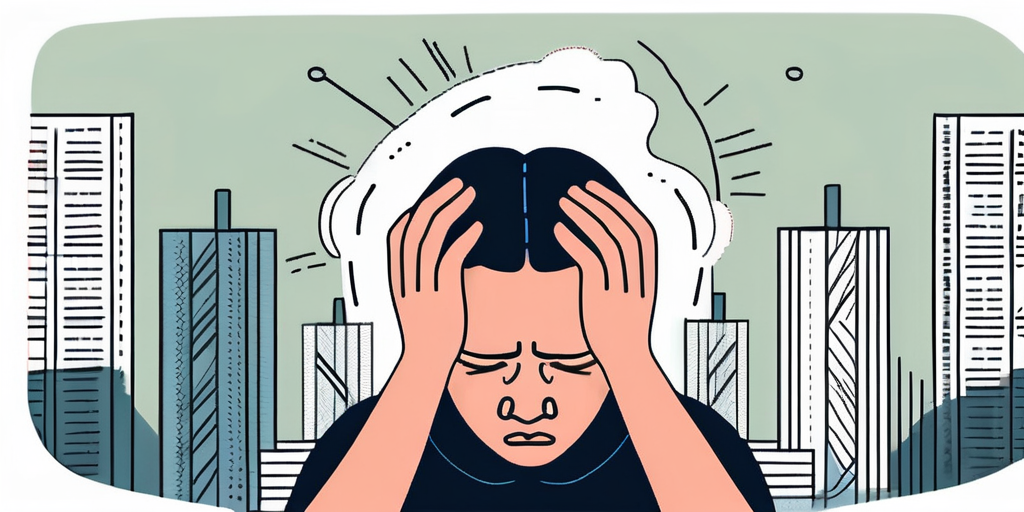The Connection Between Stress and Blood Pressure

In today's fast-paced world, stress has become an inevitable part of our lives. Whether it's work-related pressure, financial worries, or personal challenges, stress can take a toll on our overall well-being. One area in which stress can have a significant impact is our blood pressure. But what exactly is the connection between stress and blood pressure? This article will delve deep into the intricate relationship between these two crucial factors.
Understanding Stress: A Brief Overview
Before we dissect the connection between stress and blood pressure, it's essential to have a clear understanding of stress itself. Stress can be defined as a physical and psychological response to external pressures or internal concerns. It triggers a surge of hormones that prepare our bodies to either fight or flee from potential threats.
Stress is a complex phenomenon that impacts individuals in various ways, influencing both their physical and mental well-being. It is crucial to recognize that stress is not inherently negative; in fact, it can sometimes serve as a motivating factor, pushing individuals to achieve their goals and overcome challenges. However, when stress becomes chronic or overwhelming, it can have detrimental effects on overall health and quality of life.
Defining Stress: Physical and Psychological Aspects
On a physical level, stress can manifest as increased heart rate, rapid breathing, and tensed muscles. Simultaneously, it affects our mental and emotional well-being, leading to irritability, anxiety, and difficulty concentrating.

Moreover, the impact of stress is not limited to the individual experiencing it; it can also affect their relationships, work performance, and decision-making abilities. Recognizing the signs of stress in oneself and others is crucial for implementing effective coping strategies and seeking support when needed.
Common Causes and Types of Stress
Stress is often triggered by various factors, including job demands, personal relationships, financial instability, and major life changes. Additionally, stress can be categorized into acute stress, which is short-term, and chronic stress, which persists over an extended period.
It's important to note that individuals may respond differently to stressors based on their personality, past experiences, and coping mechanisms. Developing resilience and healthy coping strategies is key to managing stress effectively and maintaining overall well-being in the face of life's challenges.
The Science Behind Blood Pressure
While we might be familiar with the term blood pressure, understanding its importance is crucial in comprehending the link between stress and this vital physiological marker.
When we delve deeper into the intricate workings of blood pressure regulation, we uncover a fascinating interplay of physiological mechanisms that ensure our body's equilibrium. The cardiovascular system, comprising the heart, blood vessels, and blood, orchestrates a symphony of actions to maintain optimal blood pressure levels for our well-being.
What is Blood Pressure and Why is it Important?
Blood pressure refers to the force of blood against the walls of our arteries as our heart pumps it throughout our body. It is measured using two values - systolic pressure (the higher number) and diastolic pressure (the lower number). Maintaining healthy blood pressure is vital as it ensures adequate blood flow to all our organs and tissues.
Furthermore, the regulation of blood pressure involves a delicate balance of hormones, such as renin and aldosterone, which act on the kidneys to adjust blood volume and vessel constriction. This intricate system showcases the body's remarkable ability to adapt and maintain stability in the face of varying internal and external challenges.
Factors Influencing Blood Pressure Levels
Several factors can influence our blood pressure levels. These include age, genetics, lifestyle choices, such as diet and exercise, and underlying medical conditions like obesity, diabetes, and kidney disease.
Moreover, environmental factors like stress and exposure to pollutants can also impact blood pressure regulation. Understanding these multifaceted influences provides a holistic view of how our bodies respond to different stimuli and highlights the importance of a comprehensive approach to maintaining cardiovascular health.
The Physiological Link Between Stress and Blood Pressure
Now that we've laid the foundation let's explore how stress and blood pressure are interconnected.
Understanding the intricate relationship between stress and blood pressure involves delving into the body's complex response mechanisms. When an individual encounters a stressful situation, the brain's hypothalamus triggers the release of stress hormones, such as adrenaline and cortisol, into the bloodstream. These hormones act as messengers, signaling the heart to beat faster and the blood vessels to narrow. As a result, the body experiences a surge in blood pressure, preparing it for a fight-or-flight response.
How Stress Triggers Blood Pressure Spikes
When we experience stress, our bodies release stress hormones, including adrenaline and cortisol. These hormones cause our hearts to beat faster and our blood vessels to constrict, leading to a temporary increase in blood pressure.
Furthermore, the activation of the sympathetic nervous system during times of stress plays a pivotal role in elevating blood pressure. This branch of the autonomic nervous system is responsible for mobilizing the body's resources in the face of stress, leading to heightened alertness and increased cardiovascular activity. The combination of hormonal and neural responses sets the stage for a rapid spike in blood pressure, showcasing the intricate dance between the mind and body.
Chronic Stress and Long-term Blood Pressure Impact
While acute stress-induced blood pressure spikes usually subside once the stressor is removed, chronic stress can have long-term effects on our blood pressure levels. Prolonged stress can contribute to the development of hypertension, also known as high blood pressure, which is a risk factor for cardiovascular diseases.
The prolonged exposure to stress can disrupt the body's natural balance, leading to sustained high blood pressure levels even in the absence of immediate stressors. The cortisol released consistently causes the body to retain fluids which can increase blood volume and lead to blood pressure elevation. This chronic elevation in blood pressure puts a strain on the heart and blood vessels, increasing the risk of heart disease, stroke, and other cardiovascular complications. Managing stress through relaxation techniques, exercise, and mindfulness practices is crucial in maintaining healthy blood pressure levels and overall well-being.
Stress Management Techniques for Blood Pressure Control
Fortunately, there are several effective strategies for managing stress and mitigating its impact on our blood pressure.
It is important to understand that stress can have a significant impact on our overall health, especially when it comes to blood pressure. Chronic stress can lead to increased heart rate, constricted blood vessels, and elevated blood pressure levels. This is why incorporating stress management techniques into our daily routines is crucial for maintaining our cardiovascular health.
Lifestyle Changes for Stress Reduction
Adopting a healthy lifestyle can significantly reduce stress levels. Regular exercise not only helps in managing weight and improving cardiovascular health but also acts as a natural stress reliever by releasing endorphins, the body's feel-good hormones. A balanced diet rich in fruits, vegetables, whole grains, and lean proteins provides essential nutrients that support overall well-being.
Quality sleep is also vital for stress management, as lack of sleep can exacerbate stress levels and contribute to higher blood pressure. Additionally, relaxation techniques like deep breathing exercises, progressive muscle relaxation, or mindfulness meditation can help calm the mind and reduce stress hormones in the body.
Medical Interventions and Therapies
For individuals experiencing chronic stress or underlying mental health conditions, medical interventions and therapies may be necessary. Counseling or therapy sessions with a mental health professional can provide valuable tools and coping mechanisms to better manage stressors. Cognitive-behavioral therapy (CBT) is particularly effective in identifying and changing negative thought patterns that contribute to stress. In some cases, medications such as beta-blockers or ACE inhibitors may be prescribed to help regulate blood pressure levels in conjunction with stress management techniques.
The Role of Regular Monitoring and Check-ups
In the journey to understand and manage the connection between stress and blood pressure, regular monitoring and check-ups play a crucial role.
Regular monitoring and check-ups are essential components of maintaining overall health and well-being. By consistently tracking your blood pressure levels, you can gain valuable insights into how your body responds to stressors and external factors. This information is key in identifying patterns and trends that may impact your blood pressure, allowing for early intervention and prevention of potential health issues.
Importance of Regular Blood Pressure Checks
Regularly monitoring your blood pressure allows you to track any fluctuations and identify potential issues before they become major concerns. It empowers you to take proactive steps in managing your stress and maintaining optimal blood pressure levels.
Furthermore, regular blood pressure checks serve as a proactive measure in preventing serious health conditions such as heart disease, stroke, and kidney problems. By staying vigilant and informed about your blood pressure readings, you are taking a proactive approach to safeguarding your long-term health.
Stress Assessment and Its Role in Blood Pressure Management
Additionally, assessing your stress levels and identifying stressors can help tailor an effective management plan. This may involve seeking support from healthcare professionals or engaging in stress reduction techniques tailored to your specific needs.
Understanding the impact of stress on your blood pressure is a crucial step in developing a comprehensive health strategy. Stress can elevate blood pressure levels and contribute to the development of hypertension if left unmanaged. By addressing stress through mindfulness practices, relaxation techniques, and lifestyle modifications, you can mitigate its adverse effects on your cardiovascular health.
In conclusion, stress and blood pressure are undeniably intertwined. Managing stress levels is crucial not only for our mental and emotional well-being but also for maintaining healthy blood pressure levels and reducing the risk of cardiovascular diseases. By adopting a holistic approach that combines lifestyle changes, medical interventions, and regular monitoring, we can effectively navigate the connection between stress and blood pressure, empowering ourselves to lead healthier and more balanced lives.
Thanks for reading.
BestPharmaReviews.



